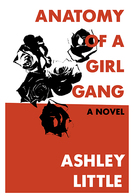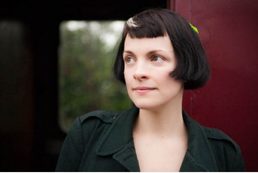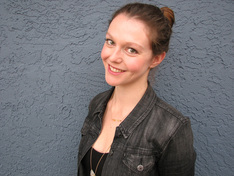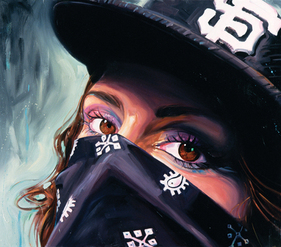 Ashley Little is a mind-blowingly gifted writer, and reading her novel Anatomy of a Girl Gang is like being hit by a truck. Told in six powerful voices, it's her third novel, and won the Ethel Wilson BC Book Prize, and was longlisted for the Dublin IMPAC Award. Ashley was born in Calgary, and completed her BFA in Creative Writing and Film Studies at the University of Victoria and her MFA in Creative Writing at the University of British Columbia. In spite of the violence and energy of her work, she comes across as gentle and soft-spoken, a paradox I love. I'm so interested in how she created the shape of her book. 1. Did you have any alternate titles for your book? Yes, She Walks Softly, ripped off from the Ice-T song, Big Gun. I now hate that title, although I still like the song. Also, The Black Roses, which is the name of the gang. 2. What made you pick the one you did? Did that come to you fully formed at the start, or later? It was one of the first titles I had in mind before I started writing and I liked it the best. I think Anatomy works on a few levels because it is both the study of something and helped me to think about the gang as a living organism; a single biological unit. 3. How did you start this book--an image, a word, a general idea? After almost three years of research, I heard the character Sly Girl’s voice in my head. She said, “I was shot in the face three years ago.” I knew that was the first line of the novel and that I was ready to start writing it. 4. How did you find the sense of an ending--did you know when to finish? Did the ending remain the same through different drafts? My original ending was deemed “too hopeless” by my agent and other editors. I was coerced into writing a more hopeful ending which I resented at the time because I thought it felt tacked on and sugary, but now I’m happy that I did. Now I see that it works better that way (even though I couldn’t at the time) and I’m glad they gave me that push. I personally really like down-endings, but I think most readers don’t or can’t handle them. Or they don’t sell. Something like that. One day I’ll write a book with a down-ending and it will sell really well and I’ll prove them all wrong. 4. Could you choose a symbol to represent your book? A shape, person, piece of music, anything you like? Yes, it is this cover of Straight Outta Compton (N.W.A.) by Nina Gordon of Veruca Salt. I probably listened to this song over a thousand times while thinking about and writing Anatomy of a Girl Gang. 5. Did the book grow out of anything autobiographical? Did writing it change your view of the past? The novel’s setting came from an inexplicable attraction that I had to Vancouver’s Downtown Eastside. Sometimes I felt like I was using the research for the novel as an excuse just to go down there and hang around. But after spending years researching that space and thinking about, visiting it, reading about it, writing about it, watching films on it, and talking about it, I don’t feel the need to go there anymore when I’m in Vancouver. It’s like I got it out of my system. I figured out what I needed to know about it and what it meant to me, and that was important for me on a personal level, outside of anything to do with the novel.
0 Comments
 I'm lucky enough to have persuaded the one and only Emma Hooper, author of Etta and Otto and Russell and James, to lend me her authorial brain to pick. I met Emma last month in Toronto. A Canadian writer and musician now teaching in the UK, she's smart, funny, and unfazed by running in strange cities. Her novel is gentle and rhythmic, but fearless in exposing its characters' innards. It's really a beauty. Below are her answers to my Storybrain questions. 1. Did you have any alternate titles for your book? What made you pick Etta and Otto and Russell and James? Did that come to you fully formed at the start, or later? Well, before it was anything, when it was just a scrap of notes, the word doc was called, “Grandpa bit”. Not as good as “Etta and Otto and Russell and James”… I usually save deciding on a name for after a whole first draft is done. Then I came up with a short list of options, including such things as, “Obstacles of Smaller Water” and “Their Something Like Silence” and “If a song is in tune, or if something is red or green”. Then I said them all out-loud a bunch of times and “Etta and Otto and Russell and James” had the best rhythm to it and looked great — all those double letters — so it won. 2. How did you start this book--an image, a word, a general idea? About seven years ago I learned that my grandfather’s hair all went white when he went over to WWII. I found this so striking; it was such a strong image, that I wrote it down and saved it to be the starter, the seed of something. Eventually, a few years later, I found it again, at it was the start of this book... 3. How did you find the sense of an ending--did you know when to finish? Did the ending remain the same through different drafts? In one respect, knowing what I was heading towards was easy with this project; I was walking with Etta, I just had to make it to the sea. But, in another, I still had to figure out what would happen once she got there! For me, writing a book is a long process of getting to know your characters better and better, and, in so doing, getting better and better at knowing what choices they’d make, what they’d do next, so, while I didn’t know what would happen to Etta and Otto when I started, or even half way through, once I got to the conclusion, to the water, they were real enough to me to direct their own endings. 4. Could you choose a symbol to represent your book? A shape, person, piece of music, anything you like? This book is hot and dry, burnt orange and yellow, dust. 5. Did the book grow out of anything autobiographical? Did writing it change your view of the past? Yep, like I mentioned in question (answer) 2., the book started with a real life fact about my grandfather, and the characters of Etta and Otto share further traits with my grandparents too. That same grandpa was from a Saskatchewan farm family of fifteen kids, like Otto, and, like Etta, my grandmother did teach in a one room prairie schoolhouse, and that is where they met. But I suppose that’s more biographical than autobiographical… as for the latter, well, the character of Winnie, though not a huge part, is the one I identify with most… I think I probably snuck her in there to be me, a little bit…  Being rich in smart writer friends, and interested in how the brain creates stories, I had the idea of starting a series asking some of them about how their work was shaped. Chelsea Rooney is the inaugural Storybrain! The author of Pedal, a brilliant and powerful debut novel (Caitlin Press), which was a finalist for the 2015 Amazon.ca Award and a 49th Shelf Book of the Year, Chelsea hosts a monthly episode of The Storytelling Show on Vancouver Co-Op Radio. I love talking with Chelsea as much as I love reading her stuff. She is just as smart in life as she is on the page. Read more at chelsearooney.com. 1. Did you have any alternate titles for your book? What made you pick Pedal, and where did it come from? Alternate titles are funny to recall, because they so clearly mirror certain stages of my research. The first, sly, Wicked Little Girls followed by the angrier Fuck Trauma. I settled on Pedal for its movement and verve. The word has momentum. The novel is short and moves quickly. The narrative spans just several weeks, with plenty of flashbacks filling the cracks. I also liked how “pedal” echoed a main theme, pedophilia. 2. How did you start this book--an image, a word, a general idea? In 2009 I tried riding my bicycle from Vancouver to Nova Scotia. I was twenty-five years old and a mess: fresh out of a five-year relationship, my mother newly diagnosed with early-onset dementia. I was biking home to be with her. The trip was difficult, but one moment of joy stands out. A sunny morning in Banff, Alberta. Riding along the Bow River, teal with glacial silt. And beside the river in a field, a herd of deer, running with us as we rode. My cycling partner, a happy Swiss man, whooped with joy and shouted at them, “Come on, girls!” and for a while it seemed as though they were listening to him. It felt magic, like the reason I'd made the trip in the first place. An iteration of that scene appears in Pedal, and it was the first scene I wrote. 3. How did you find the sense of an ending--did you know when to finish? Did the ending remain the same through different drafts? I'd always had the last scene clear in my mind, but I had no idea how I would get there. It came quicker than I thought, and I was taken by surprise one morning in the coffee shop (April 27th 2012). What a strange and wonderful feeling, closing up the laptop, walking out into the world, having just finished the first draft of my first novel. 4. Could you choose a symbol to represent your book? A shape, person, piece of music, anything you like? It would have to be the bicycle. It’s the perfect machine. Aside from the earthly materials extracted to construct it, it has no harmful effects on the environment and only positive ones on its rider. You can leave it for days, months, years, and return to it easily. There’s a reason they say, “It’s just like riding a bike.” You can abandon a bicycle, but a bicycle will never abandon you. This kind of faith was the same sort it took to write Pedal. 5. You've been clear about your novel's autobiographical basis. Did writing it change your view of the past? Did the fictional transformations you made affect your view? Ironically. I started writing Pedal to prove that the experiences I’d had as a child—experiences I’d hesitated to call “abuse”—had no negative impact on me…Insert endless laughs forever here. It wasn’t until I handed Pedal off to readers (thesis advisors, agents, publishers, editors) and heard their readings of it that I began to see my experiences—and their impact—objectively. My certainty was replaced with bewilderment, a state that shaped my rewrites, and a state I now infinitely prefer. |
ALIX HAWLEYI'm the author of My Name is a Knife, All True Not a Lie In It, and The Old Familiar. Archives
February 2021
Categories |

 RSS Feed
RSS Feed
